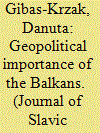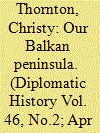| Srl | Item |
| 1 |
ID:
175649


|
|
|
|
|
| Summary/Abstract |
The Balkan Peninsula, located in South-Eastern Europe, is the fourth of the large European Peninsulas. The Balkans are considered the least known part of the Old Continent, which has for centuries been the scene of conflicts and wars. This article presents the geographical location of the Balkans and analyzes geopolitical theories that refer to this region. The main aim of the article is to show that the Balkans were subject to complex geopolitical processes and are still a zone of instability in Europe. This region is characterized by an extraordinary dynamic of change, which is a consequence of the interrelationship between geography and history. The post-Cold War enlargement of NATO and the EU shows that the border of geopolitical influence has shifted significantly and that the area of the Balkans has partly lost its former position as a border region.
|
|
|
|
|
|
|
|
|
|
|
|
|
|
|
|
| 2 |
ID:
185597


|
|
|
|
|
| Summary/Abstract |
The debate over whether the United States should join the League of Nations, an intense and sometimes acrimonious battle that pitched Republican against Democrat, president against congress, and reservationist against irreconcilable, was fought on a complicated terrain. The world order as it had existed had been shattered, and a new battle emerged between world leaders over what might replace it. The question of how to deal with vanquished enemies was crucial, of course, as was the dispensation of colonial territory; the map of Europe and its imperial possessions would be redrawn. The role that the United States should play—militarily, financially, and politically—was a key question, and U.S. President Woodrow Wilson provided an answer with the promulgation of the Fourteen Points and the proposal for a League of Nations.1 For a surprising number of participants in the League debate, however, the question of world order turned not just on British Naval supremacy, German war reparations, or the borders of French territory, but on a problem half a world away from Europe: the Mexican revolution. Theodore Roosevelt probably put the connection in its starkest terms, in a phrase he used repeatedly in the columns he wrote about the proposed League in the weeks before his sudden death. “Mexico is our Balkan Peninsula,” he wrote in a denunciation of the League on Christmas Eve 1918, adding ominously: “Some day we will have to deal with it.”2
|
|
|
|
|
|
|
|
|
|
|
|
|
|
|
|